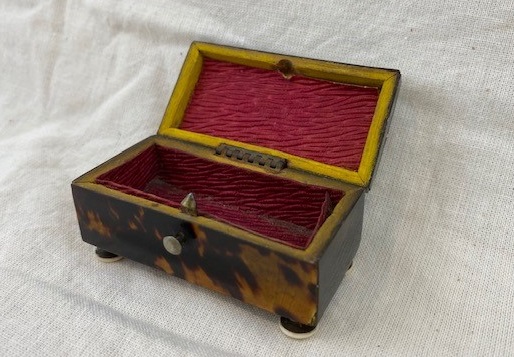by Valerie Gieb

I cannot remember the last time I witnessed my mother smile. Was it in the summer of twenty-five, when, at three years old, I crept through the doorway to watch my parents laughing and dancing to jazz music? Could it have been in twenty-seven, when my father proudly placed his new car keys in the palm of my mother’s hand, both of them dazzled by the economic prosperity around them? Or maybe it was in twenty-eight, watching my mother place her anniversary gift, a new golden necklace, around her neck.
remember my mother arrayed in a plethora of glitter and shine, her earrings bouncing with each step. Her knee-length flapper-style dress would swish back and forth across her legs. Her smile was contagious, lighting up every corner of a dark room. When the day was over, I remember how she would remove her necklaces and bracelets and place them in a beautiful, wooden, red-trimmed box.
My heart hurts at the memory. It pains me to think that my mother was once so happy and carefree. I cannot fathom that I grew up in an age where the future seemed so bright, where the threat of war and disease was far behind us and where the state of the country could only improve. Every night, my mother would place a necklace in her beautiful box and tell me that one day, as her daughter, the box would belong to me.
I sit in her bedroom now, staring at this same box. Nothing about it has changed; the wooden exterior is still marbled, and the yellow edging, although somewhat darkened with age, remains visible. Even the small, cylinder-shaped feet of the box are intact.
I walk across the room and open up the box. The red, velvety trim covering the interior has remained unscathed, and the little tooth that always kept the box closed is still as sharp as it once was. The only differences between this box and the one I remember from my childhood are the contents inside.
Inside the box, my mother’s jewelry is gone, and with it, her beautiful smile. I can recall that fateful night, when, at seven years old, I watched my father come home fighting back anger, frustration and tears. Although they never spoke about it in my presence, I caught fragments of discussion about markets, crashes and wall streets. None of it made any sense to me. All I knew is that before, my mother smiled, and now, she never does.
After that night, my father never went to work. He turned into a tired, stressed and haggard version of himself. He explained to me that the company he worked for no longer wanted him. I did not understand, because my father was the best, most hard-working person anyone could ever ask for. His distress ate at him until he was as empty inside as my mother’s beautiful box.
As for my mother; she no longer wore her jewelry. Every night, instead of placing her earrings and necklaces in the box, she simply stared at it, lost in a deep train of thought. This routine continued until, one by one, the beautiful, glittering pieces of jewelry disappeared, and the box emptied. In exchange, my mother would come home holding a handful of coins, desperately clinging to the change she had left. The box was now a safe, coins tossed in, guarding the little savings that remained.
As fast as the box emptied, the table emptied with it. Toronto was a big city, so by living near it, we would have access to milk and cheese and butter. But little by little, my mother’s pile of coins emptied, and suddenly, we lived off of bread and crackers. For the first time in my life, I went to bed hungry.
Realizing my parents’ desperate need for money, I collected old bottle caps and ration cards off of the streets. I shaped the mottled, deformed pieces of garbage into some resemblance of the necklaces my mother used to place in her box. I attempted selling my disfigured jewelry, but apart from looks of sympathy, not one person had the means to indulge in my craftsmanship. Dejected, I placed the necklaces in my mother’s beautiful box, alongside her meager collection of coins.
Seeing my family’s need for food, I salvaged seeds from an apple. It was a rare treat given to me by my father, and I made the best possible use of it. I planted one seed, to no avail: though I watered and toiled for the small patch of ground, no plant sprouted. In frustration, I threw the remaining seeds in my mother’s beautiful box.
I knew that my father needed employment, so I used my limited writing skills to address letters to factories, governments and railway managers, pleading with them to give my father work. I took the letters to the post office only to be rejected for lack of stamps. Dumbfounded, I left. If my father could not afford to put bread on the table, how was I supposed to afford to put stamps on my letters? My lip trembling, I placed my unopened letters in my mother’s beautiful box.
I noticed that every night, when my mother would open up the box, she would look at my various creations. She would adorn herself with my bottle-cap necklaces, thumb my small apple seeds, and unfold my carefully-written letters. I noticed the ghost of a smile that would come across her face.
When I was a child, my parents would tell me that I was born when the worst was already past. As a result, I grew up in an age of indulgence and carelessness, only to be hit in adolescence by a period of drought, depression, and dissatisfaction. And through it all, my mother’s box remained.
Staring at this box now, I wonder why my mother refrained from selling it along with the
rest of her jewelry. She might have made enough money to obtain a week’s worth of food, or to indulge herself in the escapism of a trip to the cinemas. I turn the box over, surprised to find a name inscribed on the bottom edge. Jack Nelson.
A vivid memory comes to mind at the mention of the name. I recall my mother carefully hanging a picture of a young uniformed soldier on our wall. More images start to flood my mind at the recollection. A newspaper article from 1917, an obituary, my mother’s tears. I can almost hear her whisper, “brother”.
Suddenly my breath quickens and I clench my jaw. How much suffering needs to be inflicted for this death and pain to cease? It is as though the Great Depression arrived because the world decided that the war had not already left enough destruction in its wake. I seethe at the injustice. Is it not enough that all that is left of my uncle is a small box inscribed with his name?
squeeze the box tighter because of the unfairness of it all, only to feel a second inscription engraved in the box. I squint, trying to make out the words. One day, the storm clouds will clear, allowing the sun to shine.
I think about my mother, staring at this box during the darkest moments. Maybe it was this that kept my mother alive every day. Maybe what strengthened her was the reminder of hope and brotherhood inscribed on this small box. Maybe she clung to this, holding out hope that someday, the storm clouds would clear.
reflect on my apple seeds, my mottled jewelry, my letters. I recall that ghost of a smile on her face, an echo of the contagious smile I loved to see every day. Maybe my small efforts to help the family gave her hope. Perhaps one day, I would see her open her beautiful box and truly smile again.
Someday, I believe that my mother’s box will stand as our family’s symbol of hope. It will be a reminder that even in times of suffering and pain, the sun always finds a way to shine.
